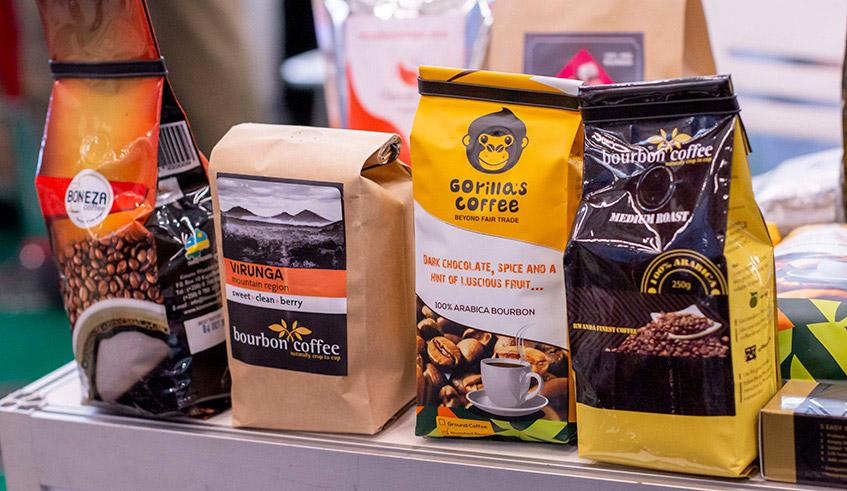Africa-Press – Rwanda. Locally grown coffee from Rwanda has been a commodity savoured around the globe. Yet according to Emmanuel Nsabimana, the head of the Tourism Regulation Department at the Rwanda Development Board, it has only been recently that coffee shops and coffee consumption has gained popularity in Rwanda.
“Say 10 years ago, you would hardly find a good spot for a cup of coffee, [it was mostly] just mostly ordinary bars,” Nsabimana said.
Within the past five years he has noticed an increase in coffee shops, especially in Kigali, which has added a new experience for coffee lovers, he said.
When Kevin Mbundu returned home after studying university in the United States, he joined the family business. It was then that he was introduced to the coffee sector and that is how he developed the Kivu Noir Coffee brand for export.
It only took two years before they expanded by starting a coffee shop where their clients could meet and learn more about their coffee. “I didn’t leave the US with the intention to open a cafe but merely join the coffee sector and help the family business and in doing so, we thought a cafe would be a nice element to add value,” Mbundu said.
According to him, they had originally speculated that their main clientele would be tourists but to their surprise, they found it was predominantly locals who patronized the cafe.
“The demographics are great because we get to see a lot of our local clients appreciating Rwandan coffee,” Mbundu said.
Since opening their first location, he said that there have been around four more coffee shops that have opened in their neighborhood which he said is a good sign.
“The more we can open cafes, the more Rwandan coffee that is produced here will be consumed within the country instead of just exporting it,” he said. “It’s a good cycle of ‘what we create is what we consume’ and that’s the trend we are banking on.”
Vincent Nzigira, the Managing Director of Bourbon Coffee, one of the biggest coffee houses in the country, said that the coffee culture in Rwanda has grown tremendously since they opened in 2007.
“When we started, coffee was grown as a crop for export and not many locals knew how to prepare or drink coffee,” Nzigira said.
Being the first coffeehouse chain restaurant in Rwanda, Bourbon Coffee had the unique opportunity of being part of the development of the coffee shop culture.
“Many cafes have opened in Rwanda because of the success of Bourbon,” Nzigira said. “We can say that we have had a multiplier effect in the sector as more people discover and grow the coffee drinking culture in Rwanda.”
Alice Van Mierlo and her husband Jean-Philippe Kayobotsi, started their coffee shop chain Brioche in 2013. It was originally intended to be a bakery but quickly developed into a coffee shop after clients requested more food options and a seating area.
“We talked about the concept of having a coffee shop chain that could be like Starbucks in the U.S. or Le Pains Quotidien in Belgium,” Van Mierlo said. “The idea for us was to create a coffee shop chain that we can grow in scale and also have our own food or bakery manufacturing bakery production facility.”
Both being part Belgian and part African (her being Algerian and he being Rwandan), they felt as though they could contribute to the development of the private sector in Rwanda.
“We were supposed to be here for a period of three years but we really liked the country and also the private sector environment in the way that it was really promoted” she said. They liked the way the government promoted the private sector as a way of growing the economy.
While the pandemic has hurt the hospitality industry, Van Mierlo said that the future of coffee shops seems promising. “People used to go back home for lunch time. But now that we have more traffic (…) people are looking for alternatives to have their lunch break” Van Mierlo said. “You can see that Kigali is growing and expanding so there is also this demand for cafés to grow alongside.”
The Rwandan diaspora has inspired a lot of changes in the coffee shop sector, said Nzigira. “The Rwandan diaspora brings new trends based on their experience abroad.” Some of the changes mentioned include having vegetarian or vegan options and having certain expectations in the service and experience in the coffee shops.
“We work hard to keep up with the changes and expectations,” Nzigira said. Nsabimana said the diaspora offers unique contributions and technologies which will help in developing the hospitality industry.
“The more they provide these innovative ideas in the industry, the more you increase the visitor experience and [increase the] spending. Not to forget employment created in the economy” he said. The lack of options previously offered resulted in coffee lovers to not consume at all, he said.
“I believe that was a hanging fruit that was waiting to be collected,” he said. “Some pressure and competition will be felt but this also plays as an opportunity for traditional players to think outside of the box and take advantage of growing trends in tastes and preferences.”
He sees the diaspora bringing trends from abroad as a positive challenge for local businesses to attract new markets and consumers. Mbundu said that Kivu Noir Coffee uses the diaspora to further the reach of their clientele.
“Using the Rwandan diaspora as brand ambassadors, through different social media posts will not only increase brand trust and value, but also portray Kivu Noir coffee as something of high quality” he said. “It will encourage their peers to try it out themselves.”
Since its first location in Kigali, Bourbon has opened seven locations throughout the US and Kigali. Nzigira said this has helped make Rwandan coffee a specialty coffee that is relished around the world.
“A lot of people who have experienced Rwandan coffee in our US stores come to Rwanda looking for Bourbon Coffee and Rwanda’s coffee story” he said. “The same is true of the reverse for Rwandans looking for a piece of home when travelling in the US.”
“Rwanda has done a lot of work to shift the narrative from its tragic past to position itself as an ambitious country of innovation and a producer of high quality specialty products” Nzigira said. “We are telling the stories of Rwanda and re-writing our history (…) through our products.”






